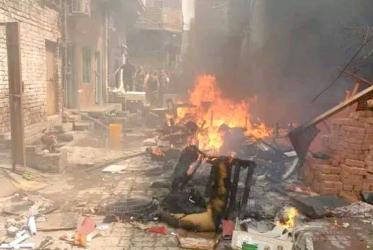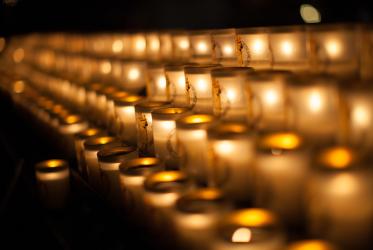Rev. Dr Samuel Kobia
Secretary General
World Council of Churches
Ecumenical Centre
Geneva, 6 January 2009
"You show that you are a letter from Christ delivered by us,
written not with ink but with the Spirit of the living God, not
on tablets of stone but on tablets of human hearts."
(2 Corinthians 3:3,RSV)
Dear Dr Kobia,
From November 24 to 28, a WCC ecumenical team visited Haiti as part of the Living Letters' initiative of the Decade to Overcome Violence. The visit represented an excellent opportunity to meet church people, Christian institutions, civil society organizations, international experts and high-ranking Haitian politicians, to better understand the complex reality of a country which is currently depicted as utter violent, corrupt and hopeless.
Haiti has experienced cycles of conflict and violence throughout its particularly painful history. Breaking the chains of slavery did not achieve peace and prosperity for the Caribbean island, as its former colonial master made their most to punish those brave men and women of African descent who dared to put into practice the ideals of freedom, equality and fraternity of the Enlightenment. Thereafter, the first Black Republic in the Americas was the scenery of recurrent power struggles involving the army, the black and mulatto elites and the merchants - a group composed by Europeans and North Americans mainly -, foreign military interventions and bloody dictatorships. These factors combined to slow or plainly block the natural progression and consolidation of public institutions and the establishment of a constitutional state and rule of law in Haiti.
Despite this violent past and present, Haitian people are not intrinsically more violent than other nations. What we found in Haiti is the blatant contrast between the shameful and humiliating living conditions in which the majority of Haitians live, and the human dignity they demonstrate in grappling with that situation. In the framework of the Decade to Overcome Violence, the situation in Haiti should be seen and understood against the background of a country where the most lethal form of violence is extreme poverty; and where the most life-threatening insecurity is the lack of food security. A sad illustration of this reality: during the time of our visit, over twenty children died of hunger in a rural area in the South of the country.
Three years from now, in 2011, Kingston, Jamaica, will be the host city for the World Council of Churches' International Ecumenical Peace Convocation, the culmination of the WCC's Decade to Overcome Violence (DOV).
The very fact that the International Ecumenical Peace Convocation takes place in Jamaica, a neighbour Caribbean country, should be a unique occasion to bring attention to the peacemaking initiatives that churches and civil society organizations have been undertaken in Haiti - sometimes with little or no support at all from the international community.
It is our innermost hope that a strong delegation from Haiti will be able to attend the Ecumenical Peace Convocation to speak about their courageous peacemaking initiatives in the fields of education, promotion and defence of human rights, health, rehabilitation and protection of the environment, accompaniment to people uprooted by natural emergencies or poverty, the defence of Haitian migrants' rights in the Dominican Republic, the work of communal organization in shanty towns and the development projects in rural areas.
Meanwhile, we would like to propose some actions that the World Council of Churches and its member churches may embark on to express their solidarity with peacemakers in Haiti.
First, churches should avoid being part of the usual campaign of stigmatization of Haiti that is orchestrated at international level by mass media and some international organizations. Instead of accepting and repeating clichés about violence and corruption in Haiti, churches have the responsibility to comprehend the real facts and tell their congregations that violence in the Caribbean island - as in many other areas in the world - is inextricably linked to a reality of historic and deep-seated injustice.
Secondly, the WCC, through its appropriate mechanisms - and its member churches around the world vis-à-vis their respective governments - is called upon to lobby to change the current classification of Haiti "as a threat to peace and security in the region". This classification is at the basis of Resolution 18540 (2008) that, in line with Chapter VII of United Nations Charter, authorizes the United Nations to keep a mission for the stabilization of Haiti (MINUSTAH), a clear violation of Haitian sovereignty and self-determination.
Dear Dr Kobia: in the occasion of your visit to Haiti in August 2005, you declared that the challenge was to move from dislocated communities living in fear to reconciliation and dignity; and stressed that all Haitians were called to work together in building a new and different Haiti, transforming it into a country of peace.
Today we want to echo your appeal by calling the government, political parties, civil society and churches in Haiti to urgently engage in the consolidation of a true, constructive and effective dialogue that can contribute concrete responses to the most critical needs of the population; and to undertake the long-term program needed to eradicate extreme poverty and to consolidate democratic institutions that really function and are duly respected. In this dialogue, we believe, Haitian churches have a major responsibility in stressing and contributing the values of justice, tolerance and solidarity.
May God bless you richly in this time of Advent.
Yours in Christ's love,
Ms Geneviève Jacques Ms Els Hortensius
Ms Marie-Claude Julsaint Ms Elsy Wakil
Mr Michael Burke Mr Manuel Quintero



